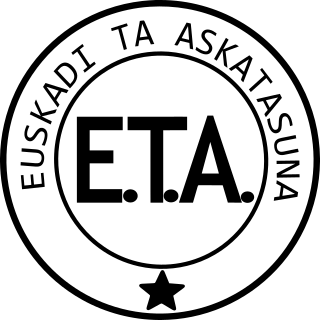
ETA, an acronym for Euskadi Ta Askatasuna, was an armed Basque nationalist and far-left separatist organization in the Basque Country between 1959 and 2018, with its goal being independence for the region. The group was founded in 1959 during the era of Francoist Spain, and later evolved from a pacifist group promoting traditional Basque culture to a violent paramilitary group. It engaged in a campaign of bombings, assassinations, and kidnappings throughout Spain and especially the Southern Basque Country against the regime, which was highly centralised and hostile to the expression of non-Castilian minority identities. ETA was the main group within the Basque National Liberation Movement and was the most important Basque participant in the Basque conflict.
Batasuna was a Basque nationalist political party. Based mainly in Spain, it was banned in 2003, after a court ruling declared proven that the party was financing ETA with public money.

The Basque Nationalist Party, officially Basque National Party in English, is a Basque nationalist and regionalist political party. The party is located in the centre of the political spectrum.

María San Gil Noain is a Spanish Basque politician. Born in San Sebastián, San Gil graduated with a degree in Trilingual Biblical Philology from the Universidad Pontificia de Salamanca. In 1991 she began working for the San Sebastián city council, representing the conservative Partido Popular. On January 23, 1995 she witnessed the assassination of her colleague Gregorio Ordóñez by the Basque separatist group ETA, and thereafter decided that she would spend her political career fighting terrorism.

Euskadiko Ezkerra was a Basque socialist political organisation. It was founded as a coalition of Euskal Iraultzarako Alderdia and other Basque Marxist forces in 1977 to present lists for the Spanish general elections in the constituencies of Vizcaya, Guipúzcoa and Álava, while Navarrese Left Union (UNAI), an allied coalition, was to present a list in the constituency of Navarre.
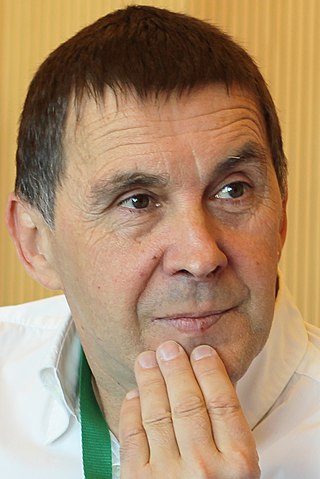
Arnaldo Otegi Mondragón is a Basque politician who is currently General Secretary of Basque nationalist party EH Bildu. He was member of the Basque Parliament for both Herri Batasuna and Euskal Herritarrok. He was one of the key negotiators during the unsuccessful peace talks in Loiola and Geneva, in 2006.

Francisco Javier "Patxi" López Álvarez is a Spanish politician serving as Member of the Congress of Deputies and chair of the Constitutional Committee.
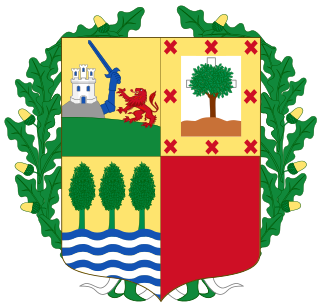
The Political Statute of the Community of the Basque Country, better known as the Ibarretxe Plan was a proposal by former lehendakari Juan Jose Ibarretxe to totally reform the Statute of Autonomy of the Basque Country by proposing a free association of the Basque Country with Spain on an equal footing, including a right to self-determination.
ETA's 2006 "permanent ceasefire" was the period spanning between 24 March and 30 December 2006 during which, following an ETA communiqué, the Spanish government, led by José Luis Rodríguez Zapatero on one side, and the militant group on the other, engaged in talks as a means to agree on a formula to voluntarily disband the latter. It was terminated as a result of the 2006 Madrid Barajas International Airport bombing.
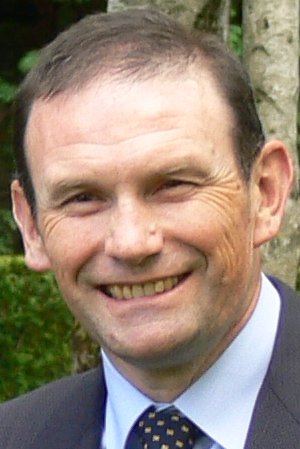
The 2009 Basque regional election was held on Sunday, 1 March 2009, to elect the 9th Parliament of the Basque Autonomous Community. All 75 seats in the Parliament were up for election. The election was held simultaneously with a regional election in Galicia. It would be the first time that the elections for two of the Spanish "historical regions"—namely, those comprising Andalusia, Catalonia, Galicia and the Basque Country itself—were held simultaneously. This would evolve into an unwritten convention in subsequent years, with Basque and Galician elections being held concurrently in 2012, 2016 and 2020.

The Basque Country, also called Basque Autonomous Community, is an autonomous community in northern Spain. It includes the Basque provinces of Álava, Biscay, and Gipuzkoa.

The 2001 Basque regional election was held on Sunday, 13 May 2001, to elect the 7th Parliament of the Basque Autonomous Community. All 75 seats in the Parliament were up for election.
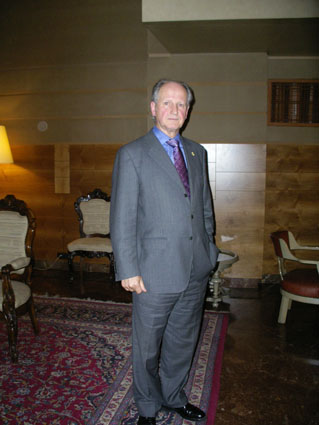
Juan María Atutxa Mendiola is a politician from the Basque Country with a nationalist ideology. A member of the Basque Nationalist Party, he was Head of the Department of Interior (1991–98) and President of the Basque Parliament (1998–2005). He currently heads the Sabino Arana foundation.

The Basque conflict, also known as the Spain–ETA conflict, was an armed and political conflict from 1959 to 2011 between Spain and the Basque National Liberation Movement, a group of social and political Basque organizations which sought independence from Spain and France. The movement was built around the separatist organization ETA, which had launched a campaign of attacks against Spanish administrations since 1959. ETA had been proscribed as a terrorist organization by the Spanish, British, French and American authorities at different moments. The conflict took place mostly on Spanish soil, although to a smaller degree it was also present in France, which was primarily used as a safe haven by ETA members. It was the longest running violent conflict in modern Western Europe. It has been sometimes referred to as "Europe's longest war".

The 2012 Basque regional election was held on Sunday, 21 October 2012, to elect the 10th Parliament of the Basque Autonomous Community. All 75 seats in the Parliament were up for election. The election was held simultaneously with a regional election in Galicia. Lehendakari Patxi López announced the parliament's dissolution half a year ahead of schedule as a result of the People's Party (PP) withdrawing their support from his government, prompting Galician president Alberto Núñez Feijóo, who had been scheduling a snap election in Galicia to be held at some point throughout late 2012, to make his decision to have a simultaneous vote.
EH Bildu, short for Euskal Herria Bildu is a left-wing, Basque nationalist, pro-independence political coalition active in the Spanish autonomous communities of Basque Country, Navarre and Burgos Province.
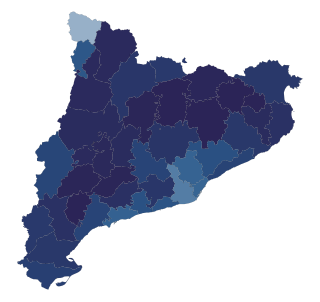
A non-binding Catalan self-determination referendum, also known as the Citizen Participation Process on the Political Future of Catalonia, was held on Sunday, 9 November 2014, to gauge support on the political future of Catalonia. While also referred to as "Catalan independence referendum", the vote was rebranded as a "participation process" by the Government of Catalonia, after a "non-referendum popular consultation" on the same topic and for the same date had been suspended by the Constitutional Court of Spain.

Eusko Alkartasuna is a Basque nationalist and social-democratic political party operating in Spain and France. The Basque language name means Basque Solidarity and abbreviated as EA. The party describes itself as a "Basque nationalist, democratic, popular, progressive and non-denominational party". Recently, the party adopted the slogan "Euskal Sozialdemokrazia".

Women in the Basque Nationalist Party in Francoist Spain were involved in leadership positions from an early period. The Basque Nationalist Party (PNV) was founded prior to the Second Spanish Republic in Bilbao, as a conservative Roman Catholic organization. They initially tried to be neutral during the Civil War, but later more openly opposed Nationalist forces. This led to repression and investigation after the war of women PNV members, and wives and daughters of male PNV members. Emakume Abertzale Batza, PNV's women political section, was operated in exile in this early period.
Arturo Alcoceba Isusi is a Spanish politician with a Basque nationalist ideology belonging to the Basque Nationalist Party, former president of the PNV in Güeñes.
















